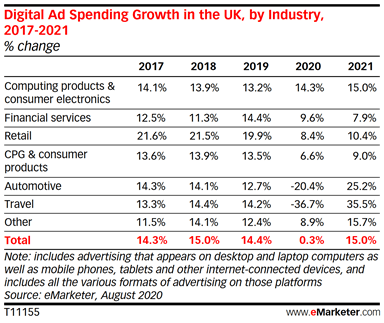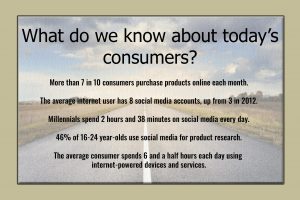How to create an effective marketing campaign
NOTE: Blog updated 07/01/2021.
Knowing how to create an effective marketing campaign is important as digital ad spend was forecast to rise in 2020.
According to Bill Fisher at eMarketer, digital ad spending in the UK was to grow by 0.3% in 2020 to reach £15.08 billion ($19.25 billion).

Although there were setbacks in the first half of 2020 as the bottom fell out of digital spend, it’s now making a steady comeback.
Some channels, such as mobile advertising, remained resilient, and others including out of home are now predicted to bounce back.
Econsultancy forecasts the growth is expected to continue into 2021 with an overall jump of 15% as both mobile and out of home advertising bounce back.
An effective marketing campaign isn’t too far out of reach if it follows a few basic principles. At its heart, digital marketing contains four essential elements:
- Social Media
- SEO
- Content Marketing
- Advertising
According to Philip Kotler, the Father of Modern Advertising: “Marketing is not the art of finding clever ways to dispose of what you make. Marketing is the art of creating genuine customer value. It is the art of helping your customer become better off. The marketer’s watchwords are quality, service, and value.”
Setting off with this goal in mind gives you a much greater chance of creating an effective marketing campaign. You are not “selling a product” but “meeting a need” that your potential customer has.
As Mr Kotler adds: “The aim of marketing is to reduce the need for selling.”
Begin at the Beginning
It’s obvious right? You have to have a starting point and that should be with a SWOT Analysis. If you don’t know what’s going on in your business or brand, how can you expect to answer your customer’s needs?
Look at the strengths and weaknesses in your business and how you can identify them. You can do this through a formal strategy or not, but choose an option which represents all levels of your company.
- S = Strengths: What you do well, your unique selling points, what makes you stand out from your competitors.
- W = Weaknesses: Ask your employees and your existing clients! Look at your systems, resources, and practices to see what needs improvement.
- O = Opportunities: Things outside of your business but which affect it.
- T = Threats: External issues which could cause problems for your business negatively.
From this, you can look at where you need to craft your digital and social media efforts and ensure that effective marketing campaign.
Do Your Research
Marketing insights are valuable pieces of information which come via research or data analysis and can be actioned to ensure an effective marketing campaign.
They should offer both the discoverer of the insight – and the benefactors of its subsequent inception – actual value in its use. Integrating this into every stage of your strategy allows for more targeted creativity and a solid ROI.
Use SMART Goals
Commonly attributed to Peter Drucker’s Management by Objectives SMART is an acronym that you can use to guide your goal setting.
To make sure your goals are clear and reachable, each one should be:
Specific
You must have a clear aim, otherwise your efforts will be unfocused. Use the five W questions to draft your campaign goal:
- What should your campaign accomplish?
- Why is this campaign important?
- Who is involved in this campaign?
- Where is it happening – social media, email campaign or a mixture of both?
- Which resources are needed and is there a budgetary limit?
Measurable
How am I going to measure the effectiveness of my marketing campaign? What do you want your marketing plan to achieve?
For example, are you hoping for a five per cent increase in newsletter subscriptions for the next quarter or do you want to drive more website traffic by 10% in the next six months?
Achievable
Be realistic! It’s unlikely you’ll see a 100% upturn in your business, no matter how well you create an effective marketing campaign. Find realistic goals which you know are attainable. Try to avoid goals which someone else has power over. Don’t include Ad Spend if you’re not in charge of the budget.
Relevant
Is it necessary to run a summer holiday email campaign in September? It might be, if you’re looking to get advanced bookings for a client offering 20% off for early sales.
Make sure whatever marketing campaign you run is relevant and that it fits in with other promotional activities.
Time bound
Set a completion date for your campaign if it relates to a specific goal, otherwise you risk focusing on the wrong tasks.
Focus On The Individual
Needs are the core of the marketing concept. Back in 1943 American psychologist Dr Abraham Maslow identified the five basic levels of human need ranking from low to high in his paper A Theory of Human Motivation.
While he focused on Physiological Needs, Safety or Security Needs, Social Needs, Esteem Needs and Self-Actualisation, to describe the pattern through which human motivations move, a similar principle applies within marketing.
The AIDA method; Create ATTENTION > Peak INTEREST > Develop DESIRE > Generate ACTION is basically an upside-down version of Maslow’s Hierarchy, which aims to drive someone from a potential buyer into a guaranteed customer.
Customers, and potential customers search for something to meet a need or solve a problem. To understand these needs is the reason for creating buyer personas.
Our recent blog on digital advertising also looked at the importance of excellent customer service throughout all levels of your business. An article on Forbes back in 2017 reported that more than $62 billion was being lost annually to poor customer service in the USA alone.
Any effective marketing campaign needs to take this salient point into account. The aim of your campaign is to drive potential buyers to your website so you can convert them into future customers.
Treat them as you’d expect to be treated yourself and provide good quality content which directly leads your potential buyers to the solution you’re offering to their problem. Don’t make them jump through hoops.
Get The Right Data
According to a 2017 report from international marketing technology brand BlueVenn, nearly three quarters (72%) of marketers considered data analysis to be the most important skill for their organisation to gain over the next two years.
In 2020, with a global pandemic causing disruption in every sector, this is more vital than ever.
Start with the best small data which you know is accurate. Sales data for example. You can then add onto this with qualified data like website traffic, form fills, email sign-ups etc.
Research from the Global Web Index GWI Work data set – representing more than 330 million professionals across 10 markets – helps marketers pinpoint who their ideal buyers are, what their interests are, where to reach them on social media, and what type of content they prefer to engage with.
Understanding what drives your potential customers in the current disruptive global market needs work. The best customer journeys are those which pinpoint exactly what they need at the right stage of their research or purchase process.
Breaking down platforms by usage frequency reveals nuances to how each generation uses social media – and how you can reach the right audience. Generation Z for example, uses Instagram and YouTube even more than messaging tools.
Newer platforms like TikTok and Twitch can also provide an effective gateway for brands to reach potential clients during disruptive markets. They’re also much more popular with younger users of social media.

Filter Out The Fake
There’s a lot of fake traffic and bots on the internet. Something we’ve blogged about repeatedly in the past.
Procter & Gamble Chief Brand Officer Marc Pritchard has spoken repeatedly about his company’s concerns about data being “walled gardens” from the big three – Facebook, Google and Amazon.
Because the companies don’t give a full picture of how ads are performing, Pritchard said P&G has been building its own database for many years to create a more complete picture of how consumers are engaging with its ads across the web.
“When we have data, it just gives us more options. We can identify other places where we can reach people. If we can work with an existing company, any company, whether it be walled garden or not, and get some good precision and get some good reach and cap frequency and all that, then we go for that,” he added.
Samuel Scott gave a keynote speech on a similar issue in 2019 in which he stated “Everything Online is Fake.” He backed up this bold claim with plenty of empirical data and research and published the full contents of his speech on his own website.
“Most analysts have found that around 50% of website traffic is bots — not human beings. I could pay money to send a bot to any website and do almost whatever I want. So, at least half of the numbers in your traffic analytics platforms are fake,” he writes.
Our website’s Ad Fraud Industry Facts addresses just a fraction of the problems which have plagued digital advertising and which can prevent you creating an effective marketing campaign.
Cut Through The Noise
Veracity’s digital campaign intelligence lets you see in real time how your marketing and social media efforts are working – or not – and gives you the ability to cut through vanity metrics and get to solid data.
Our campaign management lets you see all the results of your digital marketing in one dashboard, which means you can easily make tweaks and help ensure your running an effective marketing campaign.
The latest version of the app introduced four new feature updates and three beta improvements affecting bot mitigation and journey processing.
We’d like to invite you to talk to us and try these new features for yourself, and see how you can optimise your digital marketing campaigns with Veracity.


